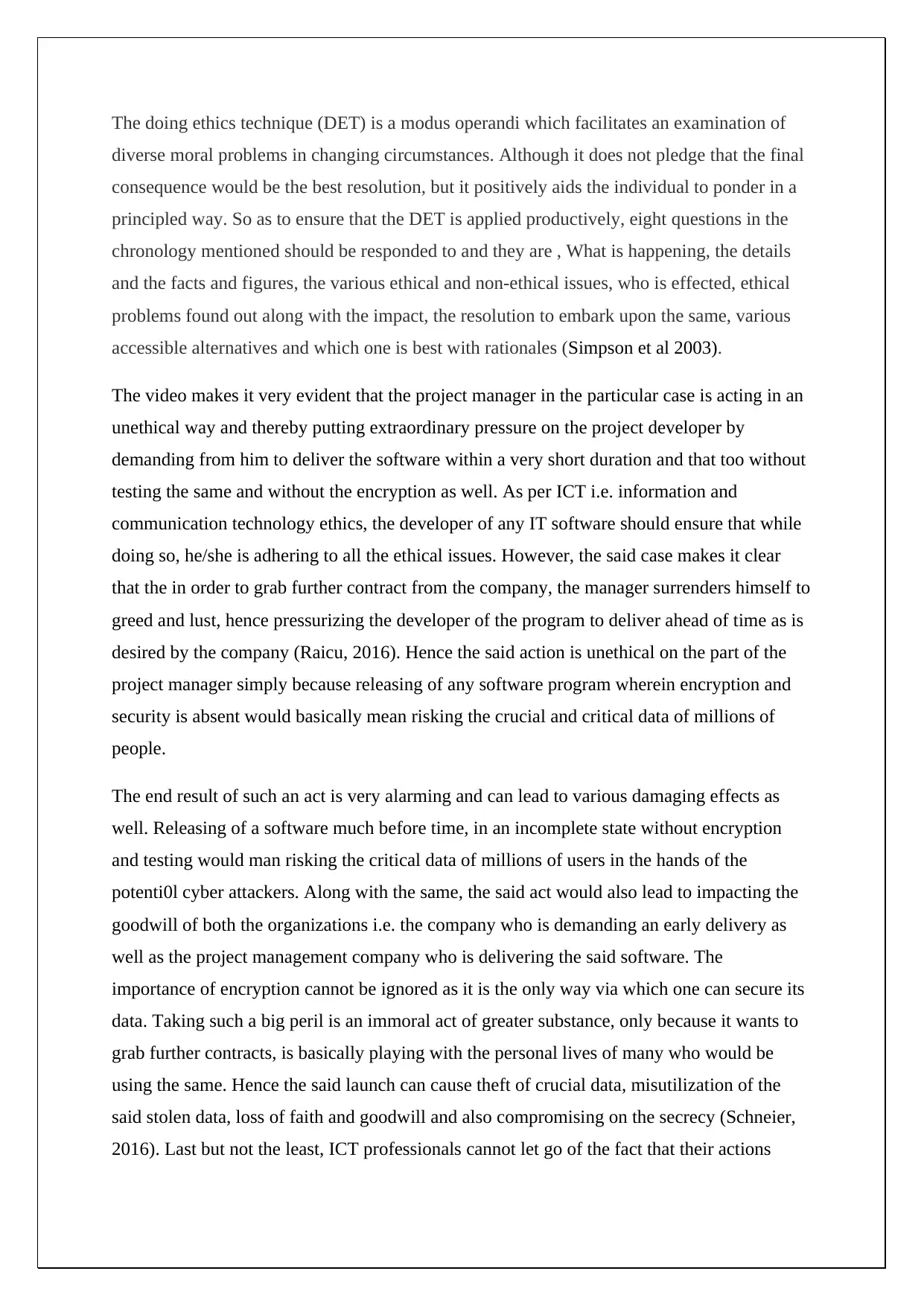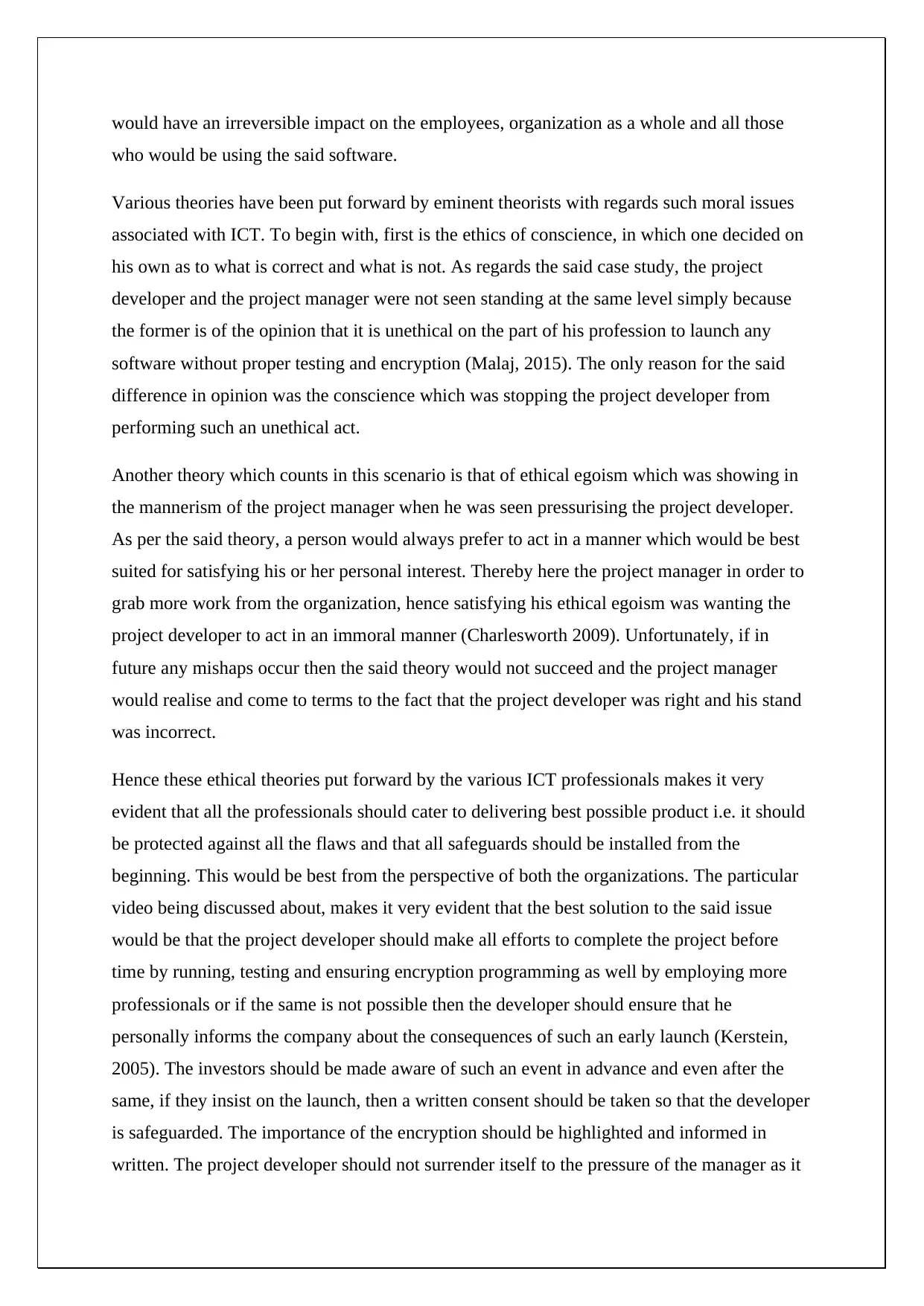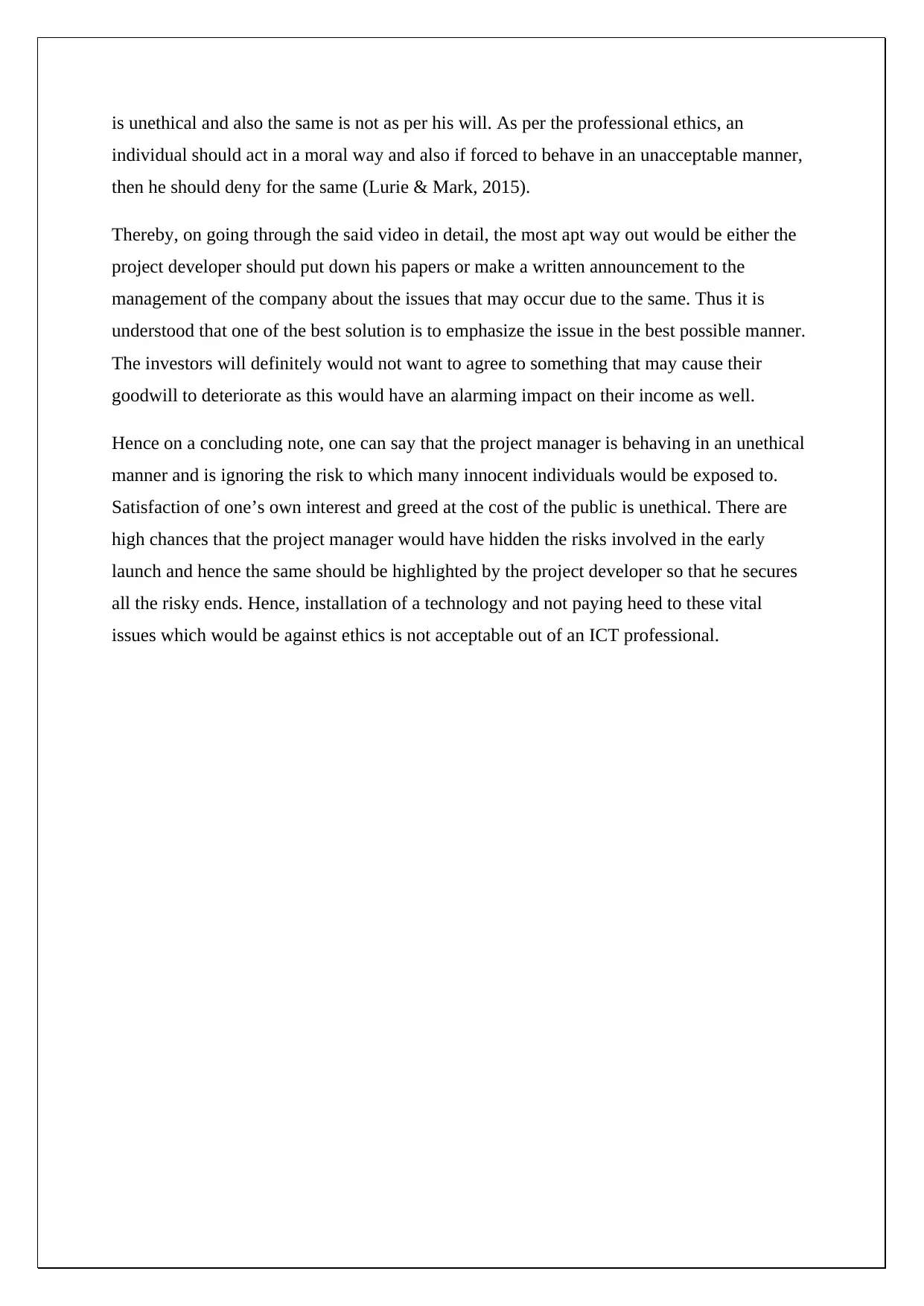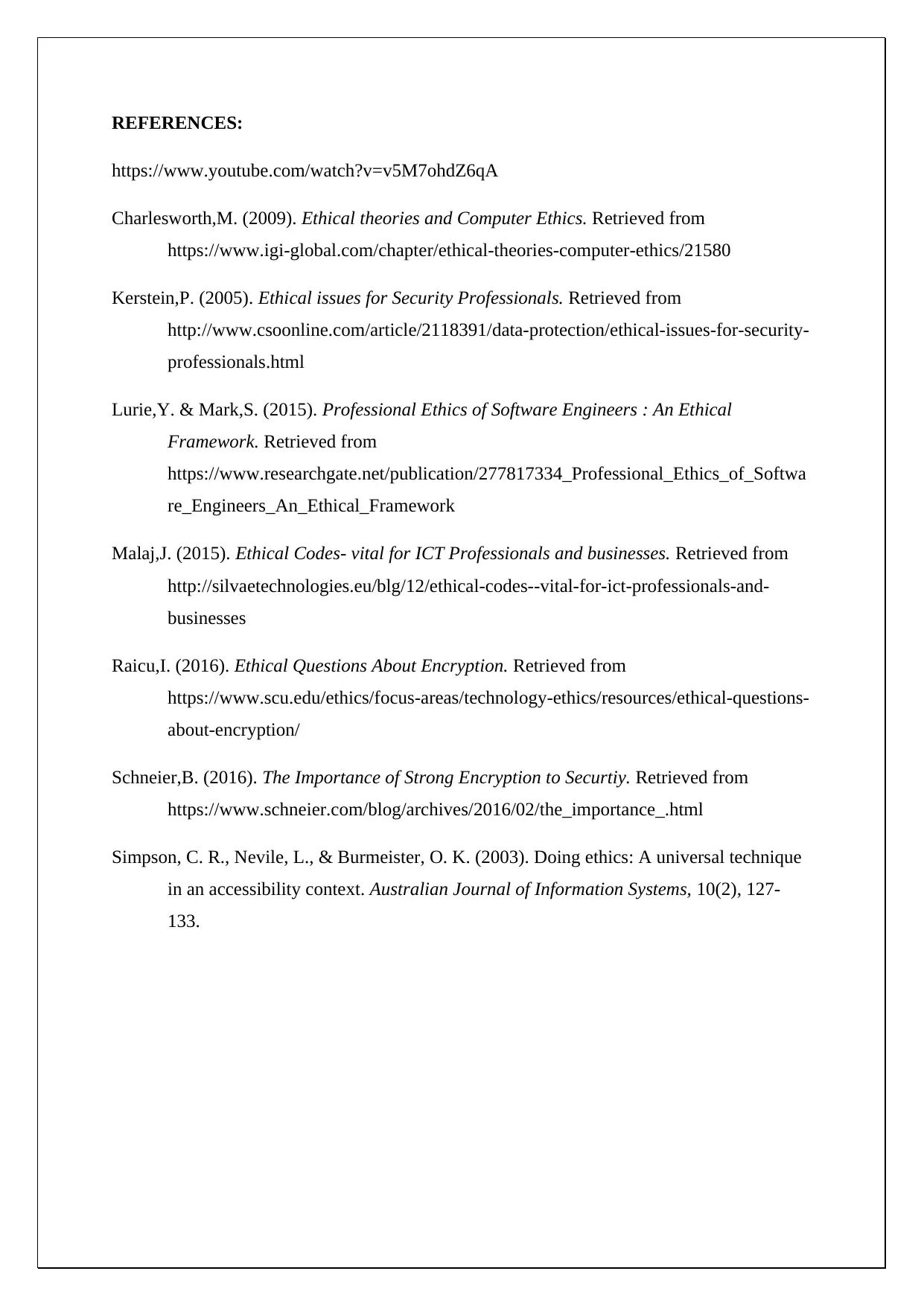Ethical Dilemma in Software Development
VerifiedAdded on 2020/03/04
|6
|1495
|254
AI Summary
The assignment delves into an ethical dilemma presented in a video where a project manager pressures developers to launch a software project despite known security vulnerabilities. It emphasizes the importance of transparency, investor awareness, and written consent for such launches. The document stresses the developer's responsibility to prioritize ethical conduct, even under pressure, highlighting the potential consequences of ignoring these risks.
Contribute Materials
Your contribution can guide someone’s learning journey. Share your
documents today.

Secure Best Marks with AI Grader
Need help grading? Try our AI Grader for instant feedback on your assignments.

The doing ethics technique (DET) is a modus operandi which facilitates an examination of
diverse moral problems in changing circumstances. Although it does not pledge that the final
consequence would be the best resolution, but it positively aids the individual to ponder in a
principled way. So as to ensure that the DET is applied productively, eight questions in the
chronology mentioned should be responded to and they are , What is happening, the details
and the facts and figures, the various ethical and non-ethical issues, who is effected, ethical
problems found out along with the impact, the resolution to embark upon the same, various
accessible alternatives and which one is best with rationales (Simpson et al 2003).
The video makes it very evident that the project manager in the particular case is acting in an
unethical way and thereby putting extraordinary pressure on the project developer by
demanding from him to deliver the software within a very short duration and that too without
testing the same and without the encryption as well. As per ICT i.e. information and
communication technology ethics, the developer of any IT software should ensure that while
doing so, he/she is adhering to all the ethical issues. However, the said case makes it clear
that the in order to grab further contract from the company, the manager surrenders himself to
greed and lust, hence pressurizing the developer of the program to deliver ahead of time as is
desired by the company (Raicu, 2016). Hence the said action is unethical on the part of the
project manager simply because releasing of any software program wherein encryption and
security is absent would basically mean risking the crucial and critical data of millions of
people.
The end result of such an act is very alarming and can lead to various damaging effects as
well. Releasing of a software much before time, in an incomplete state without encryption
and testing would man risking the critical data of millions of users in the hands of the
potenti0l cyber attackers. Along with the same, the said act would also lead to impacting the
goodwill of both the organizations i.e. the company who is demanding an early delivery as
well as the project management company who is delivering the said software. The
importance of encryption cannot be ignored as it is the only way via which one can secure its
data. Taking such a big peril is an immoral act of greater substance, only because it wants to
grab further contracts, is basically playing with the personal lives of many who would be
using the same. Hence the said launch can cause theft of crucial data, misutilization of the
said stolen data, loss of faith and goodwill and also compromising on the secrecy (Schneier,
2016). Last but not the least, ICT professionals cannot let go of the fact that their actions
diverse moral problems in changing circumstances. Although it does not pledge that the final
consequence would be the best resolution, but it positively aids the individual to ponder in a
principled way. So as to ensure that the DET is applied productively, eight questions in the
chronology mentioned should be responded to and they are , What is happening, the details
and the facts and figures, the various ethical and non-ethical issues, who is effected, ethical
problems found out along with the impact, the resolution to embark upon the same, various
accessible alternatives and which one is best with rationales (Simpson et al 2003).
The video makes it very evident that the project manager in the particular case is acting in an
unethical way and thereby putting extraordinary pressure on the project developer by
demanding from him to deliver the software within a very short duration and that too without
testing the same and without the encryption as well. As per ICT i.e. information and
communication technology ethics, the developer of any IT software should ensure that while
doing so, he/she is adhering to all the ethical issues. However, the said case makes it clear
that the in order to grab further contract from the company, the manager surrenders himself to
greed and lust, hence pressurizing the developer of the program to deliver ahead of time as is
desired by the company (Raicu, 2016). Hence the said action is unethical on the part of the
project manager simply because releasing of any software program wherein encryption and
security is absent would basically mean risking the crucial and critical data of millions of
people.
The end result of such an act is very alarming and can lead to various damaging effects as
well. Releasing of a software much before time, in an incomplete state without encryption
and testing would man risking the critical data of millions of users in the hands of the
potenti0l cyber attackers. Along with the same, the said act would also lead to impacting the
goodwill of both the organizations i.e. the company who is demanding an early delivery as
well as the project management company who is delivering the said software. The
importance of encryption cannot be ignored as it is the only way via which one can secure its
data. Taking such a big peril is an immoral act of greater substance, only because it wants to
grab further contracts, is basically playing with the personal lives of many who would be
using the same. Hence the said launch can cause theft of crucial data, misutilization of the
said stolen data, loss of faith and goodwill and also compromising on the secrecy (Schneier,
2016). Last but not the least, ICT professionals cannot let go of the fact that their actions

would have an irreversible impact on the employees, organization as a whole and all those
who would be using the said software.
Various theories have been put forward by eminent theorists with regards such moral issues
associated with ICT. To begin with, first is the ethics of conscience, in which one decided on
his own as to what is correct and what is not. As regards the said case study, the project
developer and the project manager were not seen standing at the same level simply because
the former is of the opinion that it is unethical on the part of his profession to launch any
software without proper testing and encryption (Malaj, 2015). The only reason for the said
difference in opinion was the conscience which was stopping the project developer from
performing such an unethical act.
Another theory which counts in this scenario is that of ethical egoism which was showing in
the mannerism of the project manager when he was seen pressurising the project developer.
As per the said theory, a person would always prefer to act in a manner which would be best
suited for satisfying his or her personal interest. Thereby here the project manager in order to
grab more work from the organization, hence satisfying his ethical egoism was wanting the
project developer to act in an immoral manner (Charlesworth 2009). Unfortunately, if in
future any mishaps occur then the said theory would not succeed and the project manager
would realise and come to terms to the fact that the project developer was right and his stand
was incorrect.
Hence these ethical theories put forward by the various ICT professionals makes it very
evident that all the professionals should cater to delivering best possible product i.e. it should
be protected against all the flaws and that all safeguards should be installed from the
beginning. This would be best from the perspective of both the organizations. The particular
video being discussed about, makes it very evident that the best solution to the said issue
would be that the project developer should make all efforts to complete the project before
time by running, testing and ensuring encryption programming as well by employing more
professionals or if the same is not possible then the developer should ensure that he
personally informs the company about the consequences of such an early launch (Kerstein,
2005). The investors should be made aware of such an event in advance and even after the
same, if they insist on the launch, then a written consent should be taken so that the developer
is safeguarded. The importance of the encryption should be highlighted and informed in
written. The project developer should not surrender itself to the pressure of the manager as it
who would be using the said software.
Various theories have been put forward by eminent theorists with regards such moral issues
associated with ICT. To begin with, first is the ethics of conscience, in which one decided on
his own as to what is correct and what is not. As regards the said case study, the project
developer and the project manager were not seen standing at the same level simply because
the former is of the opinion that it is unethical on the part of his profession to launch any
software without proper testing and encryption (Malaj, 2015). The only reason for the said
difference in opinion was the conscience which was stopping the project developer from
performing such an unethical act.
Another theory which counts in this scenario is that of ethical egoism which was showing in
the mannerism of the project manager when he was seen pressurising the project developer.
As per the said theory, a person would always prefer to act in a manner which would be best
suited for satisfying his or her personal interest. Thereby here the project manager in order to
grab more work from the organization, hence satisfying his ethical egoism was wanting the
project developer to act in an immoral manner (Charlesworth 2009). Unfortunately, if in
future any mishaps occur then the said theory would not succeed and the project manager
would realise and come to terms to the fact that the project developer was right and his stand
was incorrect.
Hence these ethical theories put forward by the various ICT professionals makes it very
evident that all the professionals should cater to delivering best possible product i.e. it should
be protected against all the flaws and that all safeguards should be installed from the
beginning. This would be best from the perspective of both the organizations. The particular
video being discussed about, makes it very evident that the best solution to the said issue
would be that the project developer should make all efforts to complete the project before
time by running, testing and ensuring encryption programming as well by employing more
professionals or if the same is not possible then the developer should ensure that he
personally informs the company about the consequences of such an early launch (Kerstein,
2005). The investors should be made aware of such an event in advance and even after the
same, if they insist on the launch, then a written consent should be taken so that the developer
is safeguarded. The importance of the encryption should be highlighted and informed in
written. The project developer should not surrender itself to the pressure of the manager as it

is unethical and also the same is not as per his will. As per the professional ethics, an
individual should act in a moral way and also if forced to behave in an unacceptable manner,
then he should deny for the same (Lurie & Mark, 2015).
Thereby, on going through the said video in detail, the most apt way out would be either the
project developer should put down his papers or make a written announcement to the
management of the company about the issues that may occur due to the same. Thus it is
understood that one of the best solution is to emphasize the issue in the best possible manner.
The investors will definitely would not want to agree to something that may cause their
goodwill to deteriorate as this would have an alarming impact on their income as well.
Hence on a concluding note, one can say that the project manager is behaving in an unethical
manner and is ignoring the risk to which many innocent individuals would be exposed to.
Satisfaction of one’s own interest and greed at the cost of the public is unethical. There are
high chances that the project manager would have hidden the risks involved in the early
launch and hence the same should be highlighted by the project developer so that he secures
all the risky ends. Hence, installation of a technology and not paying heed to these vital
issues which would be against ethics is not acceptable out of an ICT professional.
individual should act in a moral way and also if forced to behave in an unacceptable manner,
then he should deny for the same (Lurie & Mark, 2015).
Thereby, on going through the said video in detail, the most apt way out would be either the
project developer should put down his papers or make a written announcement to the
management of the company about the issues that may occur due to the same. Thus it is
understood that one of the best solution is to emphasize the issue in the best possible manner.
The investors will definitely would not want to agree to something that may cause their
goodwill to deteriorate as this would have an alarming impact on their income as well.
Hence on a concluding note, one can say that the project manager is behaving in an unethical
manner and is ignoring the risk to which many innocent individuals would be exposed to.
Satisfaction of one’s own interest and greed at the cost of the public is unethical. There are
high chances that the project manager would have hidden the risks involved in the early
launch and hence the same should be highlighted by the project developer so that he secures
all the risky ends. Hence, installation of a technology and not paying heed to these vital
issues which would be against ethics is not acceptable out of an ICT professional.
Secure Best Marks with AI Grader
Need help grading? Try our AI Grader for instant feedback on your assignments.

REFERENCES:
https://www.youtube.com/watch?v=v5M7ohdZ6qA
Charlesworth,M. (2009). Ethical theories and Computer Ethics. Retrieved from
https://www.igi-global.com/chapter/ethical-theories-computer-ethics/21580
Kerstein,P. (2005). Ethical issues for Security Professionals. Retrieved from
http://www.csoonline.com/article/2118391/data-protection/ethical-issues-for-security-
professionals.html
Lurie,Y. & Mark,S. (2015). Professional Ethics of Software Engineers : An Ethical
Framework. Retrieved from
https://www.researchgate.net/publication/277817334_Professional_Ethics_of_Softwa
re_Engineers_An_Ethical_Framework
Malaj,J. (2015). Ethical Codes- vital for ICT Professionals and businesses. Retrieved from
http://silvaetechnologies.eu/blg/12/ethical-codes--vital-for-ict-professionals-and-
businesses
Raicu,I. (2016). Ethical Questions About Encryption. Retrieved from
https://www.scu.edu/ethics/focus-areas/technology-ethics/resources/ethical-questions-
about-encryption/
Schneier,B. (2016). The Importance of Strong Encryption to Securtiy. Retrieved from
https://www.schneier.com/blog/archives/2016/02/the_importance_.html
Simpson, C. R., Nevile, L., & Burmeister, O. K. (2003). Doing ethics: A universal technique
in an accessibility context. Australian Journal of Information Systems, 10(2), 127-
133.
https://www.youtube.com/watch?v=v5M7ohdZ6qA
Charlesworth,M. (2009). Ethical theories and Computer Ethics. Retrieved from
https://www.igi-global.com/chapter/ethical-theories-computer-ethics/21580
Kerstein,P. (2005). Ethical issues for Security Professionals. Retrieved from
http://www.csoonline.com/article/2118391/data-protection/ethical-issues-for-security-
professionals.html
Lurie,Y. & Mark,S. (2015). Professional Ethics of Software Engineers : An Ethical
Framework. Retrieved from
https://www.researchgate.net/publication/277817334_Professional_Ethics_of_Softwa
re_Engineers_An_Ethical_Framework
Malaj,J. (2015). Ethical Codes- vital for ICT Professionals and businesses. Retrieved from
http://silvaetechnologies.eu/blg/12/ethical-codes--vital-for-ict-professionals-and-
businesses
Raicu,I. (2016). Ethical Questions About Encryption. Retrieved from
https://www.scu.edu/ethics/focus-areas/technology-ethics/resources/ethical-questions-
about-encryption/
Schneier,B. (2016). The Importance of Strong Encryption to Securtiy. Retrieved from
https://www.schneier.com/blog/archives/2016/02/the_importance_.html
Simpson, C. R., Nevile, L., & Burmeister, O. K. (2003). Doing ethics: A universal technique
in an accessibility context. Australian Journal of Information Systems, 10(2), 127-
133.

1 out of 6
Related Documents
Your All-in-One AI-Powered Toolkit for Academic Success.
+13062052269
info@desklib.com
Available 24*7 on WhatsApp / Email
![[object Object]](/_next/static/media/star-bottom.7253800d.svg)
Unlock your academic potential
© 2024 | Zucol Services PVT LTD | All rights reserved.





